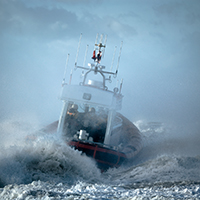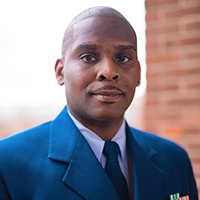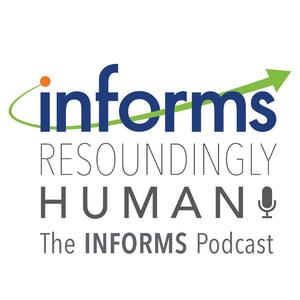Published: May 18, 2023

The U.S. Coast Guard is the oldest continuously operating naval service of the United States and has deployed to support and fight in every major U.S. war since 1790. In this episode, we explore the role analytics plays in supporting the Coast Guard as it achieves its many missions and learn how the U.S. Coast Guard Academy is preparing the next generation of those serving in its ranks to employ analytics in new and exciting ways. Joining me for this episode are Commander Matthew Williams, head of the U.S. Coast Guard Academy’s Department of Mathematics; Ian Frommer, professor in the mathematics department; and first class cadets Elise Birkhaeuser and Clayton Forfinski, both majoring in operations research and data analytics at the Academy.
It’s completely opened up my perspective, I can’t really imagine a life without having taken some of these courses and some of these aspirations I have now in it. The Coast Guard just has so many opportunities in data analytics and so many things that are within our realm right now to try to improve, let alone going to grad school later on and tackling that. But yeah, it’s exciting!
Interviewed this episode:

Commander Matthew Williams
U.S. Coast Guard
CDR Matthew Williams is the Head of the Mathematics Department at the United States Coast Guard Academy. He graduated from the U.S. Coast Guard Academy in 2007 with a B.S in Operations Research and Computer Analysis. After serving two tours of duty at sea, he earned a Master of Science degree in Computer Science specializing in Computational Operations Research at the College of William and Mary and a Ph.D in Industrial Engineering at Northeastern University. He also holds a credential as a Certified Analytics Professional (CAP ©). He joined the faculty at the U.S. Coast Guard Academy in 2013, and became a member of its Permanent Commissioned Teaching Staff in 2016.
Throughout his time at the Academy, CDR Williams has served in a number of roles, including faculty senator, member of the Superintendent’s Equity Advisory Council, Coastal Sailing Training Program (CSTP) Officer in Charge and assistant coach for the Men’s Tennis Team. He has also served of the Board of Directors for the U.S. Coast Guard Academy Alumni Association and currently serves on the Board of Directors for the Child and Family Agency of Southeast CT.
In his spare time, CDR Williams enjoys playing basketball and tennis and composing music. He lives in Waterford CT with his with Zakkyya and children Nasir and Nuri.
Related Episodes
Episode Transcript
Ashley Kilgore:
I’d like to start this episode out by sharing a fun story that, for me, highlights how diverse and yet interconnected the INFORMS community is. At the INFORMS annual meeting this past October in Indianapolis, I had the pleasure of meeting Commander Matthew Williams with the US Coast Guard. As we were chatting, I learned that he was the head of the US Coast Guard Academy’s Department of Mathematics. So I put Commander Williams on the spot right then and there and invited him to join me on the Resoundingly Human Podcast. Not only did he agree, but he also arranged to be joined by Ian Frommer, professor in the mathematics department, as well as first class cadets, Elise Birkhaeuser and Clayton Forfinski, who are both majoring in operations research and data analytics at the Academy.
Before we jump into this episode, I wanted to share some interesting facts I learned about the US Coast Guard in researching. It was established by Congress as the Revenue Marine, later known as the US Revenue Cutter Services in 1790 at the request of Alexander Hamilton. The modern US Coast Guard was created when the US Revenue Cutter Service and the US Lifesaving Service were merged in 1915 under the Department of the Treasury. Then in 1939, the US Lighthouse Service was also merged into the US Coast Guard.
Today the Coast Guard is the maritime security search and rescue and law enforcement service branch of the United States Armed Forces. The US Coast Guard has deployed to support and fight in every major US war since 1790 and is the oldest continuously operating naval service of the United States. So with all that said, welcome everyone. I’m excited for this behind the scenes look at analytics in the US Coast Guard and the Academy. And as the daughter of a career Marine, it’s always a pleasure to have the chance to highlight a branch of the armed forces. So thank you all for joining me today.
CMDR Matthew Williams:
Thanks for having us.
Ashley Kilgore:
To start, can you explain the role of the Coast Guard in the modern armed forces?
CMDR Matthew Williams:
So the Coast Guard is uniquely positioned a member of the armed forces, but also an agency under the Department of Homeland Security. And so because of that, we have statutory authority to conduct military operations as well as law enforcement operations within the US. And so there’s 11 mission [inaudible 00:03:15] or so that we have ranging from things like drug interdiction, migrant interdiction, search and rescue, fisheries operations. And we’re a relatively small service, so we have about 4,200 people in our service, which is smaller than the NYPD, but despite that, we are actually a global service. And so we have units in Antarctica, we have units in the Middle East performing poor security emissions. We’re also in South America doing drug interdiction and so pretty global, and although we’re small, we have a big impact.
Ashley Kilgore:
Now looking back, what were some of the earliest applications of analytics in the Coast Guard?
CMDR Matthew Williams:
We’ve always collected data like most military services do. The issue that we ran into is that our data collection and our analytics were pretty much performed in silos. And so you’d have analysts in West Northeast looking at fishery stuff and you’d have someone else down in Florida looking at, let’s say some migrant ops or some drug and addiction information, two totally different sets of data, and the analysts were kind of coming up with their own products under their own direction.
So there wasn’t really a centralized place where the products that we were looking for for analytics was being driven. There also wasn’t necessarily a pipeline to keep analysts in a certain area. And so if you had someone who had a particular skillset and they left to go somewhere else, maybe a project just stopped. And we realized that that was a problem for conducting large scale operations. And in recent years, we’ve really consolidated a movement to put all of those entities in one place under one direction and be able to share those type of products across the organization and keep them moving forward.
Ashley Kilgore:
And how have these evolved over the years to our modern applications?
CMDR Matthew Williams:
In 2020, our Vice Commandant commissioned what she called the Data Readiness Task Force. This was a collection of OR and analyst experts across the organization that was supposed to come together and figure out what our framework for analytics would be moving forward. So they spent about two years looking at all sorts of things from what domains we cared about, what infrastructure we had to house data.
And at the end of that two year task force, they came up with a proposal for the Office of Data and Analytics, which stood up in September of last year. That office is supposed to prioritize our governance practices with data, come up with a strategy to develop a data literate workforce and help to understand what data domains we need to be concerned about, such as the workforce management and ship maintenance.
So we’re ultimately moving towards a workforce that is kind of highly specialized in certain areas, so maybe you know a lot about ships or you know a lot about fisheries and therefore you know what products to look at, what type of data you would need to create those products, and ultimately what insights you’re looking to find.
And so last year we actually appointed our first chief data officer, and we are in the process of implementing a big data platform we call Surveyor. So that’s going to bring in structured and unstructured data from multiple sources and also be able to go in and pick the data sets that they want to look at, create products and insights, and also share that information with DOD and DHS.
And as far as projects, I mean here at the Academy we’re always engaging in research and there’s a ton of research that’s happening, like I said, in different parts of the organization. But even last year, we’ve started looking at questions from around the Coast Guard. One of those questions that was posed to us was where should leadership training be held and when? So kind of almost like a facility location type problem. We’re also we’re asked when and where should space operations be conducted off to coast of San Francisco? So we’re looking at historical traffic data and trying to figure out what the optimal solution of that is.
We have an analyst working with the management department to look at gender survey data and determine if there’s any evidence of gender bias that we need to address and correct in the service. And we also have a professor who’s working with our research and development center doing some natural language processing, and ultimately he’s trying to figure out basically if we have a case whether or not there was actually a person in the water based off some narratives, and ultimately that’s going to support us determining what the survival time of the person in the water actually is versus our estimates. So anyway, we’re supporting the Coast Guard here with multiple projects, usually about five or six that are cadet driven. We usually have multiple professors doing research for the Coast Guard as well.
Ashley Kilgore:
Within the Academy, can you give a brief overview of how the analytics curriculum is structured and what the professional pathways are?
Ian Frommer:
So one way to understand the curriculum is to view the program as consisting of three tracks that all students take. So we have a deterministic modeling and optimization track. So you can think of your classic OR like LP, IP, network optimization, nonlinear optimization. We’ve had two courses in that for many years, and we recently added a third course with more advanced topics, more complex problems and computer implementation in Python.
The second track is probabilistic modeling and statistics. So that includes the foundations and probability theory and mathematical statistics. And then it goes on to applications we will often see in OR. Things like utility theory, multi-attribute decision making, forecasting, Markov chain simulation and so on. We recently added a statistical learning class to that, that covers machine learning techniques from this perspective.
And the third track that we have is a computing track. So this is primarily concentrated in the three course sequence. There’s an introductory programming course, which is in Python, and that’s not specific to our major. We have other majors taking that. It’s followed by an information systems course. This is where our students get some of the data science that they’ll receive in our program. So that includes data acquisition, web scraping, data cleaning, data analysis, data visualization, but also includes databases in SQL as well as a module on VBA, Visual Basic for Applications, which we still find our graduates using in the operational Coast Guard after they graduate. The computing ends up being in some of our other courses as well outside of that track.
So this all occurs after students have a foundation in three semesters of calculus, and of course in linear algebra. They’re also required to take two major area electives. The major area electives are often slotted in one of the tracks that I mentioned above. We’ve had machine learning electives each of the past few years alongside other kinds of electives like risk analysis.
Finally, students work on a capstone project in their senior year, and you’ll probably hear a little bit more about that soon. These open-ended problems come from the Coast Guard, the real world problems needing real solutions. Sponsors coming from Coast Guard units provide support and guidance to the teams.
Regarding the pathways, so we’re educating our own employees. Our students will go on to be the ones solving the biggest or analytics challenges that the Coast Guard faces. So the career path on the Coast Guard are driven by the operational specialties such as flight or float operations, but there are 60 operations research or data analytics jobs for active duty officers at various ranks. Annually, the Coast Guard funds approximately five to seven officers to attend graduate school in OR analytics programs, and immediately they serve in analyst positions upon graduation. We’re currently developing jobs for the following professional roles. We have a data engineering position, data analyst position, and data scientists positions.
Ashley Kilgore:
Are there significant differences between the analytics academic pathways at the Academy versus that of a civilian university?
Ian Frommer:
Yeah. So the last time we took a comprehensive outward look at this was during our 10-year program review, which was close to 10 years ago. At that point, we focused more on undergraduate operations research and/or industrial engineering programs at other schools. By the way, many of those we found on a list on the INFORMS website at the time, which was very helpful to us.
And what we found at the time by doing that outward look was that our program was fairly consistent with many of the others in terms of curriculum and also in pedagogy. Being smaller than many of the others, for example, Berkeley, Columbia, Georgia Tech, we had a little less opportunity to offer as many electives as some of those programs. And some of those programs offer the ability for students to elect which of the tracks they want to go deeper in, and our size doesn’t allow us to do that.
At this point as we begin serving our ML, AI curriculum now, the courses that we’ve started teaching and the way we’ve been infusing data science into our curriculum, we’re going to necessarily have to conduct a new outward look to external programs with these kinds of elements. So we’re just starting to do that now.
Ashley Kilgore:
So now I’d love to switch gears and hear from cadets Birkhaeuser and Forfinski. What made you interested in pursuing this area of study within the Coast Guard?
Elise Birkhaeuser:
So I actually came in not as an operations research and data analytics major, but after speaking to some of the upperclassmen who were in this major, I knew that it definitely would be for me. So I decided to switch and I completely fell in love with the coursework that we study. I’ve taken the machine learning electives that was previously mentioned by Dr. Frommer and Commander Williams, and I have loved those so much. So yeah, that’s why I chose to study it.
Clayton Forfinski:
Kind of a similar background. I didn’t come into the Academy as an OR major, and I wasn’t really convinced any of that to begin with anyways. I didn’t have a strong background in math. I wasn’t super confident in myself in those things. But I got here and I had a few great mentors and they convinced me that I could do it somehow. And I switched the end of my fourth class summer into the major. And since then, I think that my perspective has opened up pretty wildly. When I first did it, I had maybe a basic interest in calculus. I didn’t really know what that meant, but now through these electives, the professors have mentioned, it’s completely opened up my perspective. I can’t really imagine a life without having taken some of these courses and some of these aspirations I have now in it. The Coast Guard just has so many opportunities in data analytics and so many things that are within our realm right now to try to improve, let alone going to grad school later on and tackling them then. But yeah, it’s exciting.
Ashley Kilgore:
Tell me a little bit about the courses you’re taking currently. What’s a day in the life of a student studying analytics at the Coast Guard Academy like?
Clayton Forfinski:
When we first come here as a fourth class of freshman year, we all take the same courses. We all take basic calculus, chemistry, basic entry level undergrad stuff. Your sophomore year, you continue those advanced calculus, advanced physics, chemistry, whichever classes you choose to take. And then you start to take some of your programming classes, your classes that are within the math department and geared towards your OR major.
Then your junior year, you dive more heavily into that statistics computing, some of your major area electives, like some of these machine learning courses that we talked about, it’s where you get that first exposure. And then your senior year is really kind of this culminating event. So first semester, last semester, we had all these courses that dove more heavily in statistics, analytics, machine learning, kind of, it’s a little more up to us what we decided to take. And then this semester, it’s capstone. Like, capstone is our culminating project. All these things that we’ve learned and now we’re able to apply to a real Coast Guard issue. We have a few other directed studies, a few other electives that are able to take. And then every semester we take the normal Coast Guard courses like navigation. All the majors here will take a navigation course. There’s a few others that are kind of along those themes. But yeah, capstone is the name of the game this semester.
Elise Birkhaeuser:
And just to talk more about capstone, going off of what Clay was talking about, we are actually in the same capstone group. And so what we’re doing for ours, it’s more of a research based capstone with Dr. Frommer as our advisor, too.
And so the title of ours, it’s Vessel Detection and Classification through Computer Vision to Aid Maritime Domain Awareness. And so what we’re basically doing is we’re doing computer vision down on the Thames River in order to detect and classify vessels. And so since it is more of a research-based capstone, we are doing exactly that, trying to just research more and find the best ways in order to do that and create the best algorithm that we can in order to improve that, the port security of the Coast Guard.
The application to the fleet with our capstone is that it can help aid that maritime domain awareness, such as if you had maybe let’s say a bridge in your area of responsibility, there’s a lot of SAR cases usually surrounding those bridges in terms of PIWs. So if you were to have an early alert and an early response to those types of situations, that could greatly impact the resources that the Coast Guard is putting out and that can help to decrease the amount of human assets that we are expending and also monetary assets as well.
Ashley Kilgore:
What opportunities are you interested in pursuing after graduation?
Elise Birkhaeuser:
I put in for prevention and afloat billets. So I’m going to hopefully get one of those and then just learn more about the fleet initially. And then I do know that I for sure want to go to grad school to study something within data analytics. I’m not exactly sure what, just because I like so many of the different paths and I’m still weighing whether I want that to be either within the Coast Guard or maybe not within the Coast Guard. But I do think that if I were to do it with the Coast Guard, that is truly the most meaningful work I could possibly be doing just because you can see how much it would help the fleet. So that’s the route that I’m hoping to take.
Clayton Forfinski:
My path is a little different. So I applied to flight school out of here, so we’ll find out nine days from this time of recording whether or not we get that. It’s exciting. But that means that I won’t go to grad school for quite some time in that field, which I’m excited for, and it’s all kind of just the nature of it. But I eventually go to grad school for something OR related, whether it’s on my own penny or it’s the Coast Guard’s, and we’ll apply that to some of that fleet knowledge that I get in the aviation field, and we’ll go from there. There’s all kinds of avenues that we’ve already talked about that the Coast Guard is in need of.
Ashley Kilgore:
Now I’d love to hear what made you pursue a career of service?
Elise Birkhaeuser:
For me, throughout my life, I have always really been focused in trying to help other people. And whether that be starting a food pantry at my local church or just sticking up for others who might not have as big of a voice. And I think that the Coast Guard really does embody that mission. They are in the Department of Homeland Security, which they’re the only branch of the military currently in that department. So with that, they have a much more humanitarian mission base. And so that just really spoke to me. And I’m very grateful for this opportunity to be able to have attended the Academy. So that’s why I decided to pursue a path of service.
Clayton Forfinski:
Again, a different route. I enlisted right out of high school with the ambition of just living on the ocean and seeing new things and helping people. I wasn’t really sure what that meant, but I knew that it seemed different enough for me to be excited about. I had all kinds of family in the military, so it wasn’t something that was foreign to me, it was new.
I got to the fleet, did a couple years there, and I decided that I wanted to pursue an education, so I figured the quickest way to do that was the Academy, and I just wanted to be an officer. And that was kind of my ambition there. And now that I’ve been here, and I kind of touched on this earlier, my perspective is so widened. It’s so exciting and I’m excited just talking about it, but when I came here, I just want to be an officer. And now I’m approaching that point here with graduation, the opportunities just seem endless and it’s exciting to see what the Coast Guard needs, see where the Coast Guard is going and just know that I’ll get to play a part in that, it’s pretty cool.
Ashley Kilgore:
I want to thank you all again so much for joining me and sharing this special look inside the US Coast Guard and the Academy, and for sharing your personal insights.
Clayton Forfinski:
Thank you.
Elise Birkhaeuser:
Thank you so much.
Ashley Kilgore:
Want to learn more? Visit resoundinglyhuman.com for additional information on this week’s episode and guest. The podcast is also available for download or streaming from Apple Podcasts, Google Play, Stitcher, and Spotify. Wherever you listen, if you enjoy Resoundingly Human, please be sure to leave a review to help spread the word about the podcast. Until next time, I’m Ashley Kilgore, and this is Resoundingly Human.


